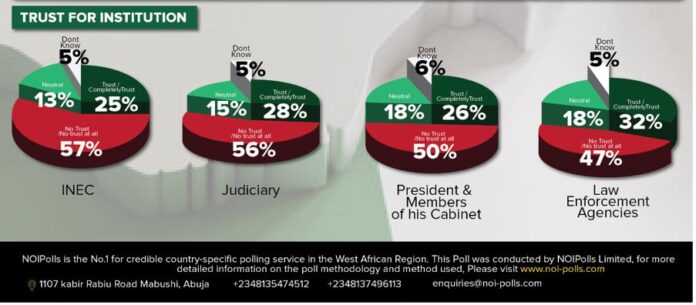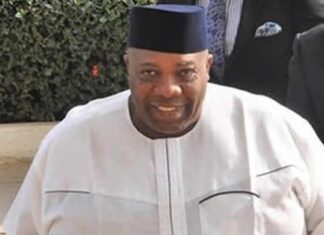Nigerians don’t trust judiciary, law enforcement agencies
By Jeph Ajobaju, Chief Copy Editor
Nigerians say they do not trust their President and the Independent National Electoral Commission (INEC), as shown in a recent opinion poll that marked the anniversary of six decades of the country’s independence.
The survey conducted by NOIPolls shows the majority (57 per cent) distrust the INEC, with 56 per cent lacking trust in the judiciary, 50 percent (the President and his cabinet members), and law enforcement agencies (47 per cent).
- Advertisement -
The result is reproduced below with some editing.
| Insecurity as a recurring concern The annual Independence Day Poll result released by NOIPolls Limited has revealed that 31 percent of adult Nigerians opined that Nigeria as a nation has not achieved anything since it attained the status of Independence in 1960. 23 percent of Nigerians cited insecurity as one of the greatest challenges Nigeria as a nation has faced since independence. Other challenges mentioned are economy (20 percent), corruption (20 percent), bad leadership (17 percent), and ethnicity/tribalism (8 percent) amongst other challenges. Despite the challenges, Nigerians still pinpoint some achievements the country has made since her Independence. The top three achievements include democracy (14 percent), national unity (9 percent), and telecommunication (7 percent). Others include large population (3 percent), electricity, (3 percent), education (3 percent), security (3 percent), and social cohesion (3 percent When asked about the single most important issue Nigeria as a nation should address in the next year, 28 percent of Nigerians mentioned the economy, which is closely followed by insecurity (21 percent). Other issues mentioned are poverty alleviation (13 percent), job creation (9 percent), corruption (8 percent), bad governance (3 percent), electricity (3 percent), and education (3 percent). Also, when respondents were asked which country has been positively impactful to Nigeria’s political and economic development since her Independence, interestingly, the United States of America (27 percent), China (24 percent) and the United Kingdom (17 percent) came top. Other countries mentioned are Israel, Ghana, France, Saudi Arabia, Niger, and Russia (2 percent each) amongst other countries. However, 22 percent of Nigerians stated that no country has had any positive impact on the political and economic development of Nigeria since independence. Survey background Independence Day is an official national holiday in Nigeria, celebrated on the 1st of October. It marks Nigeria’s proclamation of her Independence from British rule on 1 October 1960. The holiday is commemorated annually by the government and the people of Nigeria with pomp and pageantry. However, in the last decade, activities to commemorate the anniversary have continued to decline. This is a clear reflection of the state of the nation. This year, the Secretary to the Government of the Federation, George Akume, stated in a Press Conference in Abuja that Nigeria would mark its 63rd Independence Anniversary with a low-key celebration. The decision to scale back the festivities was taken considering the country’s economic challenges. “The celebration is low-key as due to the realities on the ground.” But the anniversary will be celebrated under the theme “Nigeria @ 63, Renewed Hope for Unity and Prosperity,” he said. With unmet expectations for Nigerians, this year’s Independence Day Anniversary was a time for Nigerians to reflect on their gains and challenges while mapping out feasible ways of improving on the gains. NOIPolls conducted a survey to gauge the pulse of Nigerians regarding our progress post-Independence. ____________________________________________________________ Related articles: World Bank reminds Tinubu, Nigeria needs urgent structural reforms to attract investment Nigeria urged to leverage Africa’s $300b digital economy potential US lawmaker, others canvass for Nigeria’s re-enlistment among religious freedom violators ____________________________________________________________ Confidence level in governance structures The first survey question sought to know the opinion of adult Nigerians on what they consider to be the country’s greatest achievement in the past 63 years. A larger proportion of respondents (31 percent) revealed that Nigeria has not achieved anything. Conversely, some respondents believe the country has recorded some great achievements around democracy (14 percent), national unity (9), and telecommunication (7 percent). Other achievements mentioned include large population (3 percent), electricity (3 percent), education (3 percent), security (3 percent), and social cohesion (3 percent). Eight percent of respondents interviewed cited independence, fuel subsidy, the entertainment industry, hunger and poverty, and no unity as some achievements, but 16 percent said they did not know/refused to disclose their stance. The survey sought to gauge the opinion of Nigerians on the single most important issue the country needs to address in the next one year. A larger proportion (28 percent) mentioned the economy, followed by insecurity (21 percent), poverty alleviation (13 percent), job creation (9 percent), and corruption (8 percent). Other issues mentioned include bad governance (3 percent), electricity (3 percent), education (3 percent), dollar exchange rate, inflation, fuel issue/refinery, and infrastructure (2 percent each). Some named attitudinal change, electoral reforms, healthcare, and the constitution (4 percent) as the greatest issues that should be addressed in the next one year. On the greatest challenge of Nigeria as a nation since independence, the majority of respondents (23 percent) cited insecurity. Others cited economy (20 percent), corruption (20 percent), bad leadership (17 percent), and ethnicity/tribalism (8 percent), over-dependence on fuel/crude oil (3 percent), high poverty level (3 percent), electricity (3 percent), education (1 percent), border security (1 percent), and agitations (1 percent). Nigeria also revealed their level of trust in key institutions and law enforcement agencies on a scale of 1-5. Most said they do not trust INEC (57 percent), the judiciary (56 percent), the President and his cabinet members (50 percent), and law enforcement agencies (47 percent). Nigerians who have confidence in the President and his cabinet are 26 percent, law enforcement agencies (32 percent), and those who did not know/refused to answer the survey (21 percent). Impact of foreign countries on Nigeria Those who see the impact of foreign countries on Nigeria in the past six decades named the US (27 percent), followed by China (24 percent), and the United Kingdom (18 per cent). Other countries are Israel (2 percent), Ghana (2 percent), France (2 percent), Saudi Arabia (2 percent), Niger Republic (2 percent) and Russia (2 percent). Also named are India, Canada, and Germany (3 percent each). 22 percent said no country in the world has impacted Nigeria since independence. Survey methodology The poll was conducted in the week commencing 25 September 2023. It involved telephone interviews of a proportionate nationwide sample of 1,000 randomly selected phone-owning Nigerians aged 18 years and above, representing the six geo-political regions 36 states, and the FCT. Interviews were conducted in five languages – Igbo, Hausa, Yoruba, Pidgin English, and English. Although we can say with 95% confidence that the results obtained were statistically precise – within a margin of error of plus or minus 4.65 per cent – we recognize that the exclusive use of telephone polling has its limitation of excluding non-phone-owning Nigerians. Nonetheless, with the country’s teledensity put over 100 percent by the Nigerian Communications Commission (NCC), we consider our telephone polling approach appropriate. Also, given the rigorous scientific process of randomization and stratification applied, we can confidently stand by the validity of our methodology and approach. NOIPolls Limited is number one for country-specific polling services in West Africa. We conduct periodic opinion polls and studies on various socio-economic and political issues in Nigeria. More information is available at www.noi-polls.com. |













